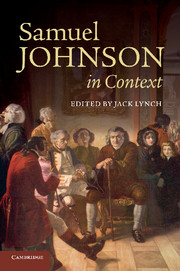Book contents
- Frontmatter
- Contents
- Illustrations
- Contributors
- Preface
- Chronology
- Abbreviations
- Part I Life and works
- Part II Critical fortunes
- Part III Contexts
- Chapter 10 America
- Chapter 11 Anglicanism
- Chapter 12 Anthropology
- Chapter 13 Authorship
- Chapter 14 Biography
- Chapter 15 Book trade
- Chapter 16 Clubs
- Chapter 17 Conversation
- Chapter 18 Dictionaries
- Chapter 19 Domestic life
- Chapter 20 Education
- Chapter 21 Empire
- Chapter 22 Essays
- Chapter 23 Fiction
- Chapter 24 History
- Chapter 25 Journalism
- Chapter 26 Law
- Chapter 27 Literary criticism
- Chapter 28 London
- Chapter 29 Medicine
- Chapter 30 Mental health
- Chapter 31 Money
- Chapter 32 Nationalism
- Chapter 33 Philosophy
- Chapter 34 Poetry
- Chapter 35 Politics
- Chapter 36 Scholarship
- Chapter 37 Science and technology
- Chapter 38 Scotland
- Chapter 39 Sermons
- Chapter 40 Shakespeare
- Chapter 41 Slavery and abolition
- Chapter 42 Social hierarchy
- Chapter 43 Theatre
- Chapter 44 Travel
- Chapter 45 Visual arts
- Chapter 46 War
- Chapter 47 Women writers
- Further reading
- Index
- References
Chapter 33 - Philosophy
from Part III - Contexts
Published online by Cambridge University Press: 05 June 2012
- Frontmatter
- Contents
- Illustrations
- Contributors
- Preface
- Chronology
- Abbreviations
- Part I Life and works
- Part II Critical fortunes
- Part III Contexts
- Chapter 10 America
- Chapter 11 Anglicanism
- Chapter 12 Anthropology
- Chapter 13 Authorship
- Chapter 14 Biography
- Chapter 15 Book trade
- Chapter 16 Clubs
- Chapter 17 Conversation
- Chapter 18 Dictionaries
- Chapter 19 Domestic life
- Chapter 20 Education
- Chapter 21 Empire
- Chapter 22 Essays
- Chapter 23 Fiction
- Chapter 24 History
- Chapter 25 Journalism
- Chapter 26 Law
- Chapter 27 Literary criticism
- Chapter 28 London
- Chapter 29 Medicine
- Chapter 30 Mental health
- Chapter 31 Money
- Chapter 32 Nationalism
- Chapter 33 Philosophy
- Chapter 34 Poetry
- Chapter 35 Politics
- Chapter 36 Scholarship
- Chapter 37 Science and technology
- Chapter 38 Scotland
- Chapter 39 Sermons
- Chapter 40 Shakespeare
- Chapter 41 Slavery and abolition
- Chapter 42 Social hierarchy
- Chapter 43 Theatre
- Chapter 44 Travel
- Chapter 45 Visual arts
- Chapter 46 War
- Chapter 47 Women writers
- Further reading
- Index
- References
Summary
PHILO′SOPHY. n.s. [philosophie, Fr. philosophia, Latin.]
1. Knowledge natural or moral.
I had never read, heard nor seen any thing, I had never any taste of philosophy nor inward feeling in myself, which for a while I did not call to my succour. Sidney.
Samuel Johnson was no systematic philosopher but, like many of the writers and thinkers of his age, he was inevitably engaged in discussions that make sense in a philosophical context. The questions that exercised eighteenth-century British philosophers – especially regarding the basis of our knowledge and the foundation of our moral sense – echoed throughout the culture as a whole. Two figures above all, John Locke and David Hume, provide a starting point for any discussion of philosophy in the eighteenth century.
Locke
John Locke published An Essay concerning Human Understanding in 1690, and for the next hundred years this work provided the dominant framework in Britain for thinking about knowledge and the mind. This was true not only of intellectuals who read Locke’s work firsthand, but also of the more general readership: the principles of his thinking became the common currency of essays and of novels. Locke’s influence was great, but to speak only of influence may be misleading. Lockean thought was widely diffused and assimilated because it synthesized ways of thinking that meshed with the wider culture. Among these were the gradual erosion of religious certainties, the rise of scientific inquiry, the conception of society as an aggregate of individuals, and the wish to understand and accommodate conflicts of opinion rather than fighting them out.
- Type
- Chapter
- Information
- Samuel Johnson in Context , pp. 286 - 293Publisher: Cambridge University PressPrint publication year: 2011
References
- 1
- Cited by



